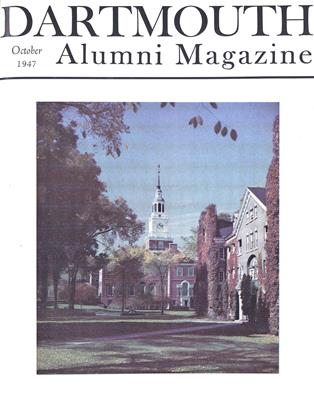Novel by Ben Ames Williams '10 Hailed as Vivid Civil War Story
October 1947 HERBERT F. WEST. '22.WHEN A REVIEWER writes about a 1500 page novel he has a good deal of responsibility. Ben Ames Williams '10 most obviously put in a prodigious amount of work in House Divided (Houghton Mifflin, 1947, $5.00). On his own admission he spent twelve to fifteen years of preparatory study and 52 months of concentrated labor in the writing of the 3,000-page manuscript. He travelled 8,000 miles over the scenes of the action, and corresponded with and interviewed historians, librarians, bookdealers, and other interested persons by the score. Fortunately, too, and this is an impressive fact, he had the advice and counsel of Douglas Southall Freeman, who knows more about the Civil War than any living man. The question now is, is the finished novel worthy of all this effort?
My own answer is an emphatic affirmative. I can't imagine any novel on the Civil War which could possibly give a more accurate picture, in almost every respect, of how the Civil War affected the lives and fortunes of the Confederacy. Furthermore, and as important, the novel is entertaining and interesting throughout. In spite of its length, and it is longer than War andPeace, I found myself interested in the lives and fortunes of the Currains and of the fate of the Southern armies until the very end. Ben Ames Williams could certainly have cut his novel and made it a finer piece of literature. He describes in conversations, sometimes a little forced, how armies are drilled, how they are fed, and many other details which most readers of fiction probably would be willing to overlook. However, in 90 percent of the instances, Williams' vast picture would have suffered in the cutting.
In War and Peace Tolstoy wanted to show the impact of Napoleon's invasion of Russia, of War itself, and did so masterfully; Williams wanted to show what the American Civil War was like and does so masterfully but without the genius of the Russian. House Divided does not have the passionate, personal, confessional quality of War and Peace. Williams is, on the whole, a dispassionate observer. His is no Russian soul, tortured with genius of a peculiar kind. He is, instead, a most competent professional writer of fiction who at long last has found a subject worthy of his energy and of his training.
If any single soldier dominates the action it is General James Longstreet, who, fittingly enough, is an uncle of the author's mother. On page 820 the author has Longstreet say of the Confederate Army: "The army will do its best, and its best is better than any other troops in the world can equal; but behind the army there's corruption, inadequacy, laziness, greed, desertion, skulking . . . . not one Southern man in ten has his whole heart in the war."
House Divided starts with a prologue in which Anthony Currain, the father of the main characters of the novel, fathers a child who becomes the mother of Abraham Lincoln. When the proud Currain descendants find this out their reactions are explosive, particularly those of Faunt Currain, who rides with Mosby, and who kills as many Yanks as he can with murderous lust. Cinda, however, one of the author's best characters, meets President Lincoln and comes to realize his greatness.
The novel follows the fortunes of the Currain family who are wealthy Southern planters, owners of slaves, and proud possessors of four great estates: Great Oak, burned by Faunt to prevent its falling into the hands of the Yankees, The Plains, Chimneys, and Belle Vue. There is action in plenty. Williams description of Gettysburg is magnificent, and more real, for its subdued quality. His novel is peopled with soldiers, bushwackers, spies, beautiful, if at times, frail women, profiteers, lovers, children, slaves, and civilians. Richmond at war is here to the life (see The Beleaguered City, by Alfred Hoyt Bill) and the author is at his best in giving the reader the feel of the South, its atmosphere and its terrain. There is chicanery, bravery, sacrifice; profiteering, lovemaking, fighting, and dying; all that life offered people who lived through that war.
The conception of House Divided is a vast one, the execution brilliant, and the book vibrates with life. Here is the Civil War, the effects of which are still felt. Personally I congratulate the author in fulfilling so well so vast a dream as must have been his when years ago he thought of writing a great novel about the War between the States. This is no flv-by-night Gone With the Wind, but a truthful, serious, and at times reallv magnificent novel.
BEN AMES WILLIAMS '10
TAKES OVER NEW JOB: Robert S. Monahan '29, formerly with the U. S. Forest Service in California who reached Hanover on Sept. 1 to assume his dual post as General Manager of the DOC and College Forester.
 View Full Issue
View Full Issue
More From This Issue
-
 Article
Article"Enter ye in by the Narrow Gate ..."
October 1947 By ALBERT I. DICKERSON '30, -
 Article
ArticleTHE GREAT ISSUES COURSE
October 1947 By THOMAS W. BRAD EN '40 -
 Class Notes
Class Notes1918
October 1947 By ERNEST H. EARLEY, DONALD L. BARR -
 Class Notes
Class Notes1915
October 1947 By SIDNEY C. CRAWFORD, CHANDLER H. FOSTER -
 Class Notes
Class Notes1913
October 1947 By WARDE WILKINS, ROBERT O. CONANT -
 Class Notes
Class Notes1943
October 1947 By FRED F. STOCK WELL, WILLIAM T. MAECK








